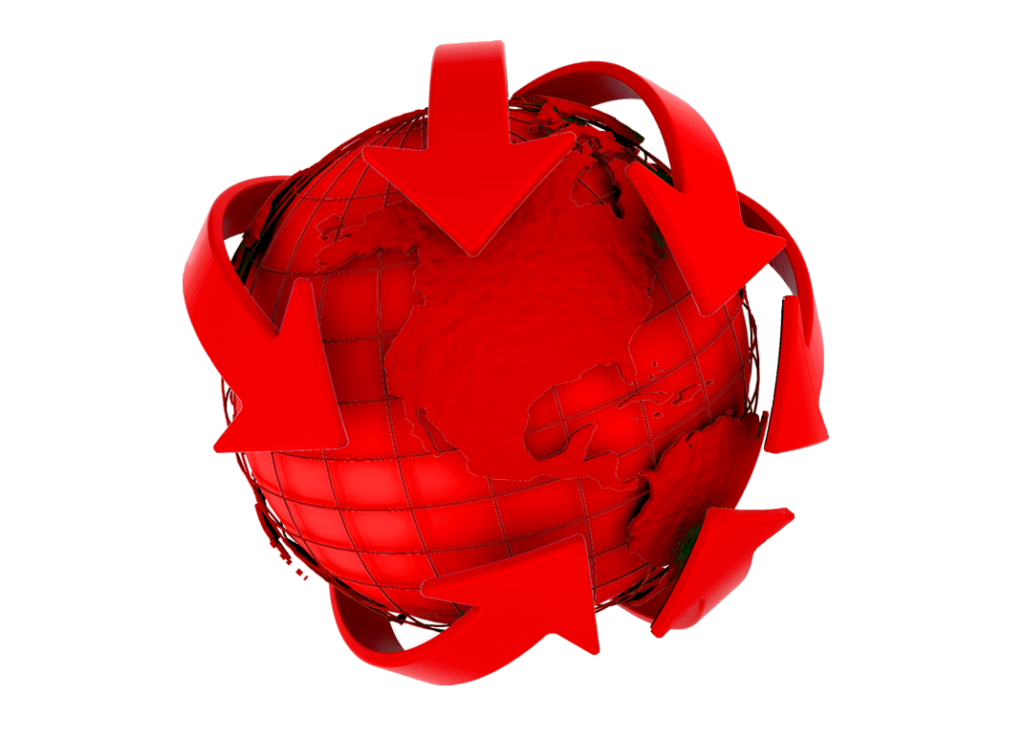Thanks to human fascination with dinosaurs and movies like Jurassic Park, most people are familiar with geological periods like the Precambrian, Paleozoic, Mesozoic, and Cenozoic. The latter period is the current geological epoch, which, according to Wikipedia, represents “the last 66 million years of Earth’s history. It is characterized by the dominance of mammals, birds, conifers and flowering plants, a cooling and drying climate, and the current configuration of continents. It is the latest of three geological eras since complex life evolved, preceded by the Mesozoic and Paleozoic.” Each larger geological period is broken into increasingly shorter periods. For example, the Cenozoic period contains the Paleogene, Neogene, and Quaternary periods. The Quaternary period, in turn, is broken into the Pliocene, Pleistocene, and Holocene periods. Wikipedia explains:
“The Holocene is the current geological epoch. It began approximately 11,700 years before 2000 CE. It follows the Last Glacial Period, which concluded with the Holocene glacial retreat. … The Holocene corresponds with the rapid proliferation, growth and impacts of the human species worldwide, including all of its written history, technological revolutions, development of major civilizations, and overall significant transition towards urban living in the present. The human impact on modern-era Earth and its ecosystems may be considered of global significance for the future evolution of living species. … In July 2018, the International Union of Geological Sciences split the Holocene Epoch into three distinct ages based on the climate, Greenlandian (11,700 years ago to 8,200 years ago), Northgrippian (8,200 years ago to 4,200 years ago) and Meghalayan (4,200 years ago to the present), as proposed by International Commission on Stratigraphy.”
The Cenozoic period is also known as the Age of Mammals and one mammal has come to dominate the Age: humans. In fact, humans are so dominant that scientists are now suggesting that our species has pushed the world into a new epoch called the Anthropocene. Journalist Katie Hunt reports, “The term Anthropocene, first proposed in 2000 to reflect how profoundly human activity has altered the world, has become a commonly used academic buzzword uniting different fields of study.”[1] Colin Waters, an honorary professor at the Geography, Geology and the Environment School at the University of Leicester and chair of the Anthropocene Working Group, told Hunt, “When it’s 8 billion people all having an impact on the planet, there’s bound to be a repercussion. We’ve moved into this new Earth state and that should be defined by a new geological epoch.”
According to the working group, this new epoch began around 1950. To make their case for this new epoch, they have identified “12 sites that could provide the key piece of evidence needed to support their proposal.” In mid-July, the scientists insisted one site — Crawford Lake in Ontario, Canada — best demonstrated the geological impact humans have had on the earth. In this case, sediment from the bottom of Crawford Lake shows evidence of “artificial radionuclides from nuclear weapons testing that spread radioactive elements around the planet. [And] markers of industrialization and globalization — nitrogen and mercury released from burning fossil fuels, microplastics pollution, nitrogen from fertilizers and other changes — also spiked at different places across the globe in the mid-20th century.”[2]
What’s the Big Deal?
Climate change is the big deal — and debates continue to rage about whether it is being caused by human activity. Identifying a new epoch triggered by human activity might convince some skeptics that humans are making an impact and can, therefore, successfully address a worsening situation. Stan Finney, secretary general of the International Union of Geological Sciences and a professor in the department of geological sciences at the California State University at Long Beach, observes, “There’s no doubt that humans have impacted the Earth system dramatically and we’re facing incredible consequences today. But it’s been a long-running (phenomenon).”[3] One of his problems with declaring a new Anthropocene period is that marking its beginning at 1950 makes little sense. The start of the Industrial Revolution might be a better place to start — if a starting point is required. Hunt reports, “Finney said it’s more accurate to describe humanity’s profound impact on Earth as an ongoing geological event rather than a formal epoch with a precise global start date. It’s also possible, he said, that stratigraphers may decide that the Anthropocene doesn’t rise to the level of epoch.”
Supply chains continue to be impacted by the “incredible consequences” of human activity to which Finney refers. Back in May 2023, journalist Gareth Vipers reported, “Global temperatures are likely to surge to record levels over the next five years and breach the 1.5 degrees Celsius threshold set out in the Paris climate agreement, scientists said in a new report. Warning that the world could be entering a new phase of climate change, researchers at the World Meteorological Organization, a U.N. agency, said there is a 66% likelihood that annual average global temperatures will exceed the threshold of 1.5 degrees Celsius above preindustrial levels by 2027. … Scientists see the 1.5 degrees Celsius limit as a key threshold in limiting the most dire consequences of climate change.”[4] Journalist Elizabeth Weise adds, “Warming of 1.5 degrees Celsius would increase heat waves, lengthen warm seasons and shorten cold seasons. If temperatures were 2.0 degrees warmer, heat extremes would more often reach critical tolerance thresholds for agriculture and health, multiple analyses have found.”[5] Each of those consequences has an effect on supply chain operations.
Although climate events and water shortages create localized crises, the global impact can be widespread. According to a study from Oxford University, “The frequency of extreme compounding hazards is projected to intensify tenfold globally due to the combined effects of warming and decreases in terrestrial water storage, under the highest emission scenario. Over 90% of the world population and GDP is projected to be exposed to increasing compounding risks in the future climate, even under the lowest emission scenario.”[6]
Can Supply Chains Help?
Perhaps a better question than “Can supply chains help?” is “Who can supply chains help?” when it comes to addressing climate change. First, and foremost, supply chains can help themselves by becoming more sustainable. Societal benefits are a secondary effect of sustainable operations. Businesses exist to generate profits; however, in order to generate profits, they must survive in a changing world (i.e., they must be sustainable). Becoming sustainable will be costly; even so, the long-term benefits are undeniable. Analysts from FastCo Works report, “Decarbonizing the economy won’t be cheap. Reaching current decarbonization goals, for example, could cost $9.2 trillion per year.[7] In the corporate arena, supply chain professionals are in the driver’s seat when it comes to corporate sustainability efforts.
Katie Stein, chief strategy officer at Genpact, insists sustainability efforts require a three-pronged strategy. They are: “[First] decarbonizing the technology footprint, which includes the move to the cloud. The second is investing in greener technologies and energy sources. And the third is rethinking business and operating models to have sustainability at their core.”[8] The key to each of these efforts is data. The late British physicist and mathematician, William Thomson Kelvin, once stated, “What is not defined cannot be measured. What is not measured, cannot be improved. What is not improved, is always degraded.” By analyzing appropriate data, better decisions can be made. Enterra Solutions® is focusing on Autonomous Decision Science™ (ADS®) to provide clients with data-enabled prescriptive and anticipatory analytics and insights. This new form of problem-solving and decision-making, goes beyond advanced analytics to understand data, perform analytics, generate insights, answer queries, and make decisions at market speed, including decisions about sustainability and decarbonization.
FastCo Works analysts conclude, “Ultimately, we’re living in a global economy. Every company’s ecosystem is, in some way, interconnected, informing not just its own operations but how everyone — from the heads of governments to individual consumers — make environmentally sound decisions.” Supply chain professionals can drive their companies in ways that turn climate change risk management efforts into a competitive advantage.
Footnotes
[1] Katie Hunt, “Scientists say they’ve found a site that marks a new chapter in Earth’s history,” CNN, 11 July 2023.
[2] Alison Snyder, “Scientists say Canadian lake marks start of the Anthropocene,” Axios, 11 July 2023.
[3] Hunt, op. cit.
[4] Gareth Vipers, “Global Warming Likely to Pass 1.5-Degree Threshold in Next Five Years, U.N. Report Says,” The Wall Street Journal, 17 May 2023.
[5] Elizabeth Weise, “Artificial intelligence predicts climate change coming faster than we recently thought, new study says,” USA Today, 30 January 2023.
[6] University of Oxford, “Compound extreme heat and drought will hit 90% of world population,” Phys.org, 6 January 2023.
[7] FastCo Works, “The secret weapon in fighting climate change? Data.” Fast Company, 5 January 2023.
[8] Ibid.





